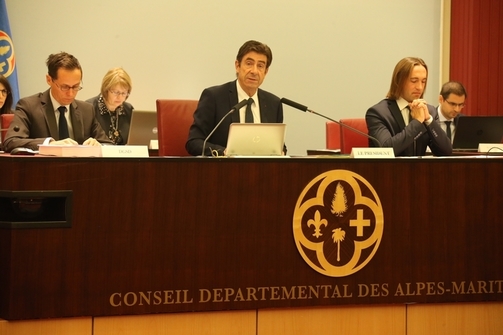The departmental council voted on the 2018 budget amidst political difficulties regarding its existence and future role: trapped between the region and the risk of metropolitan areas or inter-communities, this collective risks becoming the Little Thumb.
As well stated by Francis Tujague, communist opposition elected member, “the social aspect alone does not make a collectivity.”
While awaiting the evolution of the debate, both the majority and opposition unanimously defend the value of this local collectivity.
Charles-Ange Ginesy, signing his first budget as president, did not stray from the path set by his predecessor Eric Ciotti: the 2018 budget will be a “responsible” one.
It will focus on tax stability (the property tax on built properties remains at 12.42%); maintaining operating expenses at 916 million euros; continuing debt reduction to 811 million euros (over 100 million in the last 4 years); and the continuation of investments amounting to 220 million euros.
“What we are doing today—and what we have been doing since 2009—are the only choices available to keep our institution strong,” he said under the watchful eye of Eric Ciotti, who remains present and vigilant as the chair of the finance committee.
The president of the departmental council then outlined the most important projects for the coming year: Health, in its 10th edition (180 projects funded for a total of 27 million euros); also the AIME program which funds agricultural investments, along with ‘06 à Table’ for supplying school canteens.
Additionally, the Collège Avenir plan with 425 million euros invested since 2004.
The social aspect, the primary responsibility of the department, is also at the forefront: on the RSA side, there are 23,000 beneficiaries (out of 71,000 declared unemployed); for seniors, a whole range of interventions and means is implemented, primarily accommodation in public and private EHPAD establishments, care for 15,000 who remain at home, and the animation of social life for the elderly, a critical preventive factor. It’s allocated 531 million euros.
Territorial solidarity is another chapter: 72 million is planned for 2018 interventions, having spent 550 million on communal and inter-communal projects.
The participations (and funding) of the CRT (tourism), SICTIAM (high-speed internet), SMIAGE (flood control) agencies showcase the path of pooling resources and gathering forces.
Charles-Ange Ginesy, while advocating for coherence and continuity, knows that in public action, one must progress… thus, two new “challenge-projects” will open: Smart Deal to digitalize all competencies and meet the territory’s needs through a one-stop dematerialized counter; Green Deal concerning environmental projects. Experts will be at work to analyze them and recommend intervention strategies.
The following debate was calm: the new president of the General Council knows how to appease his opponents. His style is smooth, in contrast to the rigidity of his predecessor. He is a local elected official without national ambitions to constrain him. As a man of the land, he knows that in human relationships, lubrication is better than abrasives…
Socialist Marie-Louise Gourdon, while “referring to human and social solidarities,” limited herself to reproach him for “not doing better in the crucial area of well-being.”
Francis Tujague (PCF) echoed the same sentiments, lamenting the “massive reduction in public spending within the framework of the boundless liberalization you advocate nationally, but complain about when managing our collectivity. Resulting in the retreat of national and local public services.”
Both she and he (and their doubling) voted against the budget: opposition as best they can.
The autonomous group “Ensemble” confirmed its support for the new president through its speaker Charles Scibetta. It was already known that there was no fracture between the two components of the majority, and this vote confirms it.
The game is played elsewhere; the foot soldiers are just there to hold the ground.


